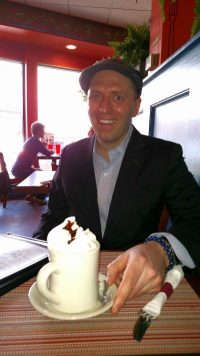
Bernardsville News – By P.C. ROBINSON Contributing Writer
BERNARDSVILLE – Don’t expect Mine Avenue resident Simon Mandal’s comedy magic act to disappear anytime soon.
Mandal, who with wife, Ruth Darcy, moved to the borough from Chatham three years ago, has performed “The Simon Show” more than 5,000 times before such A-list corporate audiences as Google, MGM Resorts, Princeton University and ABC-News, among others.
He also performs “close-up” magic, meeting unsuspecting “victims” one-on-one at private events, Boy Scout meetings and street festivals.
The slight-of-hand – and its associated improvised comedy – comes naturally to the 37-year-old London native who came to the U.S. as a child with his Irish-born parents.
“I guess I’m wired for it,” he said over hot chocolate and an Asian chicken salad at The Bernards Café. “I was always a funny kid – genetic predilection.”
Not that honing his craft was as easy as saying abracadabra.
“Starting out, it’s fun but it’s brutal,” he said. “You need to figure out what’s good for you that the audience will get a lot out of. Now, I’m really enjoying it. It’s a good, steady life.”
His craft also, well, does something magical to people when they experience it.
“It takes them out of the moment and re-sets their stress level,” he said.
Does that also go for Ruth, the Pfizer business analyst he married five years after they met at a Manhattan comedy club?
“She’s a huge fan. She thinks I’m a genius.
“You’ll print whatever I say, right?”
Those interested in enjoying their own up-close magic can do so when Mandal appears at Chatham’s annual Fishawack Festival on Saturday, June 11.
Like most performing artists, Mandal got the magic bug in his very early years in Kent, England, about an hour and a half southeast of London.
“I saw this hilarious comedy magic act on TV, and while I can’t remember who did it, I can’t remember ever laughing so hard,” he said.
By the time he and his parents moved to the U.S. and made nearby New Providence their home, he had his own magic kit and was learning the trade.
After graduating from high school, he attended Rutgers University’s Mason Gross School of the Arts, then transferred to the William Esper Studio in Manhattan, the alma mater of such well-known actors and comics as Kathy Bates, Larry David and Amy Schumer.
He also studied privately with Gazzo Osborne, an English street performer whose many international venues include Key West, Fla., and comic-magician Whit Haydn.
Eventually, he hit the floorboards of Manhattan’s comedy clubs, honing his magic and improv skills while holding down an office computer job.
Finally, he quit his day job to follow his passion, a blend of improvisation, comedy and magic.
Like all successful magicians, Mandal must update and refresh acts to keep audiences captivated.
The ones he keeps, he said, “Are the bullet-proof ones.”
Just what is in his bag of tricks?
Those include a mix of acts he learned from mentors and created himself.
Some, like the find-the-ball-under-the-cup trick, are virtually immortal, their original forms first played in Ancient Egypt.
Whatever the trick, Mandal said “things happen” where he’ll understand the trick “in a new way.”
“There’s always another level to it. Some tricks might be easier and you can learn in a day. Others may take months but finally you get that a-ha moment where it all connects,” he said.
What’s the ultimate magic act?
As much as he enjoys the one-on-one performances, Mandal said “a really great stage show” is “as good as it gets.”
“I’ve been working on the show for decades. It’s always good, but to be really great it has to have the right dynamics.
“Close-up is a lot more forgiving,’’ he said. “It has the power of seeing something up close, and it’s less demanding on the audience because you have their attention for only 10 to 15 minutes.”
Close-up or stage, for Mandal the name of the game is psychological misdirection.
Mandal is not one for sawing Ruth, in half – “although I’d saw her in three,” he jokes – or using other contraptions to captivate the crowds.
He’d rather trick someone into thinking they know exactly what they saw, when in fact, they didn’t.
“Magic takes advantage of a person’s attention, getting them to remember things the wrong way. Intellectually it didn’t happen, but emotionally, it did,” he said.
See more press.
 top
top